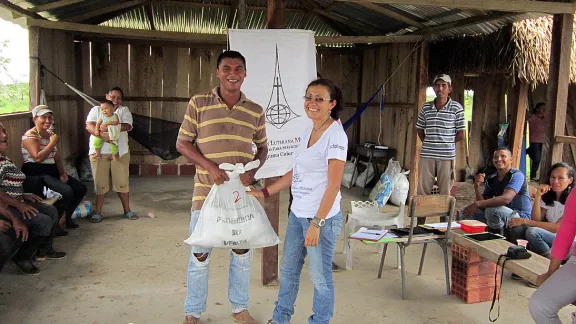
France Hernandez distributing food assistance to families affected by the harsh 2014 winter (June-July) in the department of Arauca in northeastern Colombia. Photo: LWF Colombia
Meet one of the 2500 Humanitarian Heroes at the forefront of the LWF’s emergency response. On World Humanitarian Day (19 August) we pay special tribute to their commitment to assist - often at great personal risk - those facing violence, displacement, hunger, and lack of basic human rights.
Why did you become a humanitarian worker?
My desire to serve others goes back to my childhood, and is based on the Christian values for truth, justice and freedom. This allowed me to recognize at a very early age what really matters for people in life.
Then throughout my studies and career in environmental health, I became aware of the great importance of water and basic sanitation for the quality of life of families and communities.
In addition, I admire the work carried out by the Evangelical Lutheran Church of Colombia especially its focus on displaced populations, providing psychosocial care and support to people living with HIV.
In my later studies in theology and ecumenism, I developed a broader perspective and reaffirmed the importance of service in order to transform the unequal relations which exist in our communities.
However, it is the communities that have really shaped me. The everyday experience with them has developed into a dynamic relationship that enables me to have a more human approach in my actions, ensuring that what I do is coherent and integral to the wellbeing of people’s lives.
The struggle for a decent life and a critical analysis of the prevailing system has motivated me to live a life in service to the most vulnerable, with an understanding that respect for the difference in others should form the basis for sustainable development.
Tell us a little bit about the work you do.
Currently I am in charge of humanitarian coordination and risk management in the Arauca office of the LWF program in Colombia. Arauca is located on the Venezuelan border and is one of the areas where the civil conflict is most intense.
My role is to support the formulation and implementation of strategies that help to incorporate integrated risk management in all activities of the LWF program in Arauca area. This includes coordination and support in emergency response projects and risk management training to local organizations and the most vulnerable communities.
Additionally, I support the organization in strengthening processes related to the protection and defense of territorial rights from a rights-based approach, and promote related community-based actions that give visibility to the impact of territorial issues in Arauca Department.
What's the most rewarding part of your work?
Those moments when I interact with communities, and I feel part of them. Seeing how my actions allow them to move forward and to realize their own abilities has been very rewarding.
What are some of the more challenging aspects of your work?
Colombia is a country that has experienced a very volatile and dynamic conflict. Its long duration has led to complex situations which can have double or multiple effects on one community. Crises such as displacement, natural disasters and arms’ proliferation affect communities that are already facing structural problems such as limited access to education, health, and roads among others.
In such a context, it is difficult to have a long-term analysis in order to guarantee the assistance required. In the areas where we work, we must ensure that the populations we serve are not exposed to security risks and harm.
What is the most memorable moment you’ve experienced during your work?
Between 2008 and 2013 I was working with indigenous communities in the Casanare Department [central region] in a food security project.
The major challenge for these communities of different ethnicities is that they are a nomadic population that has been allocated a small territory for resettlement. They experience high levels of malnutrition.
One day towards the end of the project, I took part in the cultural gathering of roots and berries with women from the Maiben Masiware ethnic group. In the process, Yolima, one of the community leaders began to call me daughter, and her family greeted me as such henceforth.
In recognition of the work I had undertaken, they gave me a traditional dress resembling those worn by their ancestors, and made of natural fiber from the local matapalo tree [strangler fig tree].
What does Humanitarianism mean to you?
Service.
#WHD2014 #HumanitarianHeroes



